Simple In-Home Activities for People with Disabilities
“The body heals with play, the mind heals with laughter and the spirit heals with joy”
– Proverb
Life without any form of recreational activity can become dull, and cause a negative impact on our overall health and wellbeing. Keeping ourselves physically active and mentally stimulated is beneficial to our mental health, can boost our physical health, and can encourage productivity. However, if we are limited to what we can do, trying to live an active lifestyle can become extremely challenging especially for people living with a disability. Whether it is a physical, intellectual, or invisible disability, there are still several simple activities you can safely do at home with family, friends or your companion carer.
Physical Disabilities
- Music Therapy
- Practicing Calligraphy
- Seated Virtual Exercise Classes
- Accessible Video Games
- Gardening
Intellectual Disabilities
- Sensory Play
- Learning a Foreign Language
- Adaptive Journaling
- Mindfulness Meditation
- Arts & Craft Therapy
Activities to Benefit People with (Not Limited to) Physical Disabilities
When living with a physical disability your mobility, physical capacity, stamina, or dexterity is greatly affected. These specific disabilities can be prevalent from birth or acquired through an illness or injury. Life with limited mobility or motor control can prove to be difficult, and achieving the simplest of tasks can become extremely frustrating. And, if you are stuck at home for the day trying to stay active can become problematic. Next time you or someone you love is in this position, you can try one of the following fun and physical activities to spread some joy into the day.
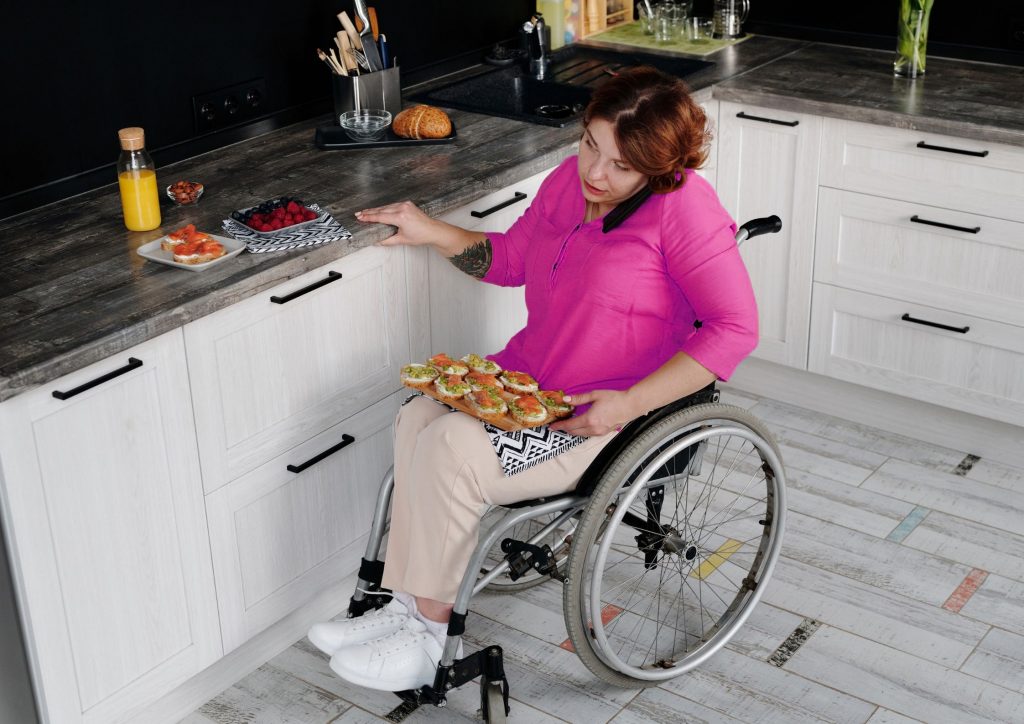

Music Therapy
Music therapy has proven to be a successful intervention for people with disabilities, helping both motor and mental coordination. It holds a range of positive benefits on mental health including, improved mood, decreased depression, anxiety reduction, and stress management, while also encouraging healthy self expression through a creative outlet.
Some types of musical activities you or your loved one can do in the comfort of your own home can include:
- Singing
- Dancing
- Playing an instrument
- Composing a song together
Studies have shown that music therapy techniques can help develop and maintain both joint and muscle function. It can also increase fine and gross motor coordination, control, muscle strength, and a range of motion. Cardiopulmonary, respiratory functioning, and improved oral-motor skills can also be achieved if these activities are undertaken on a regular basis.
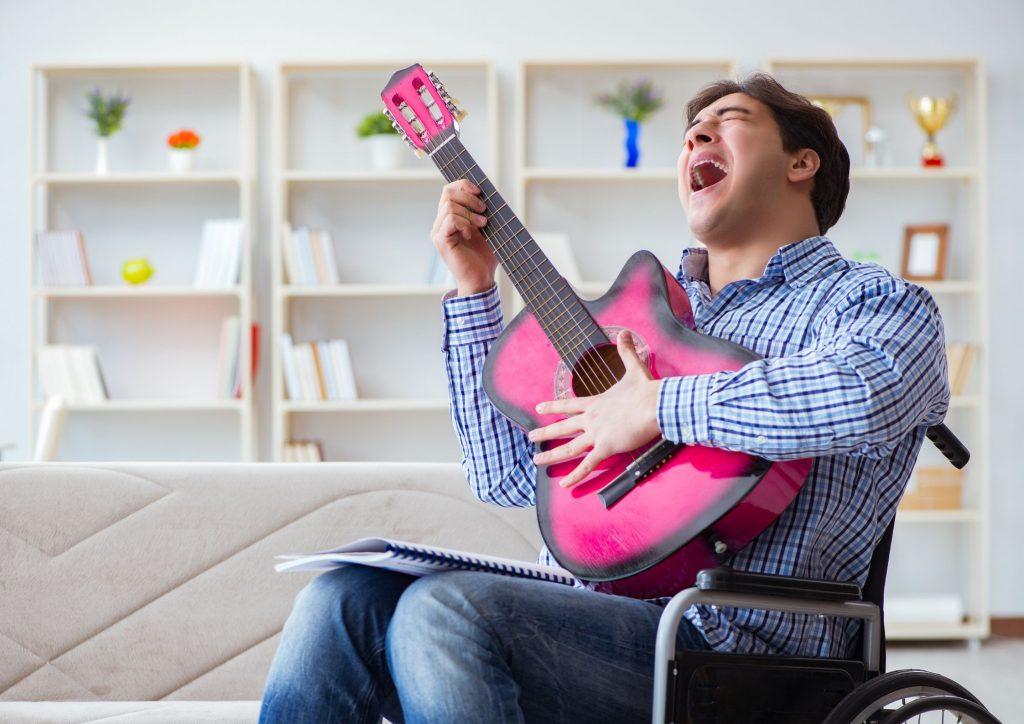

Practicing Calligraphy
Handwriting is an important skill to develop and maintain during our childhood however, as we become young adults and move into our golden years, we start to rely more on modern day technology to do the hard work for us. What we don’t realise is that handwriting can provide a multitude of benefits, especially for people with limited mobility, by helping maintain a variety of motor needs including:
- Bilateral hand skills – using both hands together to complete different tasks
- Hand Strength – improving muscles to help maintain holding positions and movements
- Thumb opposition – being able to move your thumb in multiple directions and coordinated movements
- In-hand manipulation – improving the ability ability to move items around in the hand using precise finger movements
Practicing Calligraphy can take handwriting skills to another level providing both creative stimulation and therapeutic benefits. The art of calligraphy originated thousands of years ago in ancient China and has already been embraced by many people with disabilities overseas including Zhang Wenyou and Kanazawa Shōko.
Studies have shown that practicing calligraphy is also considered a form of meditation. The soothing results of calligraphy can help you feel calmer while, at the same time, decrease your heart rate. This effect is likely to be cause by the focus required to create a flawless outcome, offering a promising new approach to reducing stress in everyday life.


Seated Exercise Classes
There has been a wide variety of studies which have proven that regular physical exercise is incredibly beneficial for our overall health, well being and self esteem. However, if you or your loved one has limited mobility, keeping active can present itself with several obstacles especially if you are stuck at home.
With support, seated exercises are an effective way to help you stay physically active in the comfort of your own home. These low-impact workouts can help increase movement throughout the day while keeping pressure off of your joints. Like other forms of physical activity, seated exercises can also offer and array of benefits including:
- Stronger muscles
- Better flexibility and balance
- Cardiovascular health
- Increased blood circulation
- Boosted energy levels
- Enhanced thinking and memory
- Improved mental health
There are a very wide variety of adaptable seated exercise classes you can access through websites like YouTube, various social media platforms or websites that specialise in seated workouts for people living with a disability.
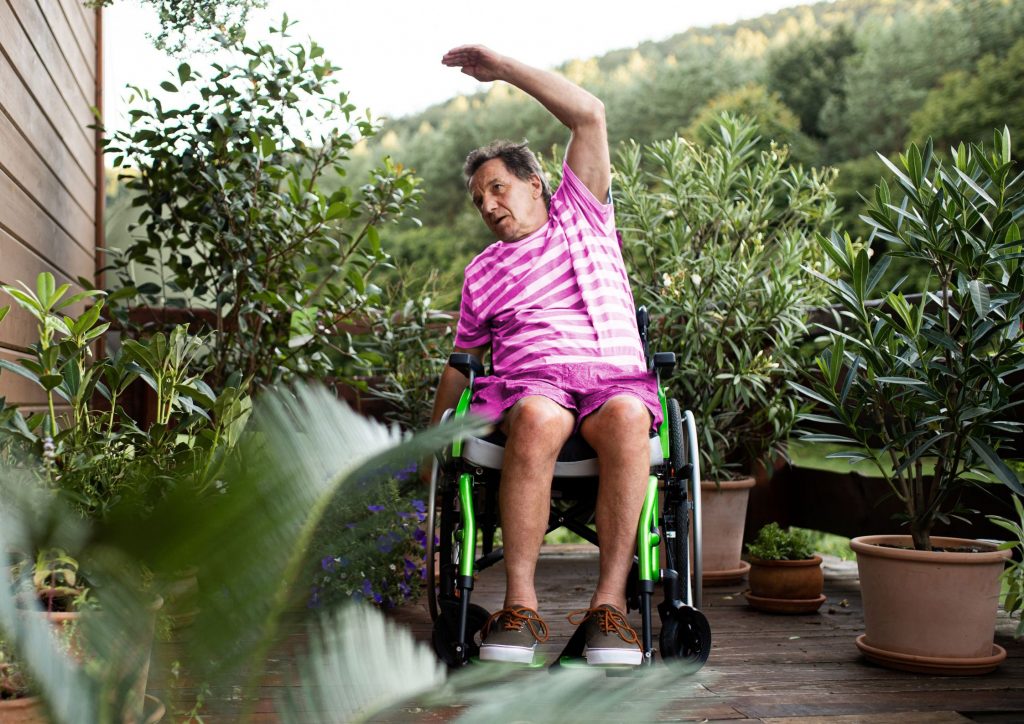

Accessible Video Games
Most of us like to participate in social activities and enjoy creating new friends. However for people living with impaired mobility, limiting factors that force them to stay at home can discourage participation in any social activities leading to a high risk of isolation and depression. Video games saw a huge leap in popularity in the early 2000s with the rise of multiplayer games allowing any group of gaming lovers from anywhere in the world, to play together.
Over the past decade independent game developers have produced numerous games to accommodate the abilities of players living with impairments through the creation of:
- Audio games – can be played without any visual feedback
- One-switch games – can be played using switch access to accommodate users with mobility or cognitive impairment
- Games catered to learning disabilities – for people with low literacy or a combination of complex intellectual needs
- Universally accessible games – offer multiple interfaces to support different impairments
Since 2020 video games have seen a massive boom in the industry as it created a new way for people to remain connected with each other, and keep maintaining a social calendar from the safety and comfort of their own homes. This growth also greatly included a huge rise in accessible video games, which can now combat common gaming and social barriers during periods of isolation for people with sensory impairment, motor impairment and cognitive impairment.
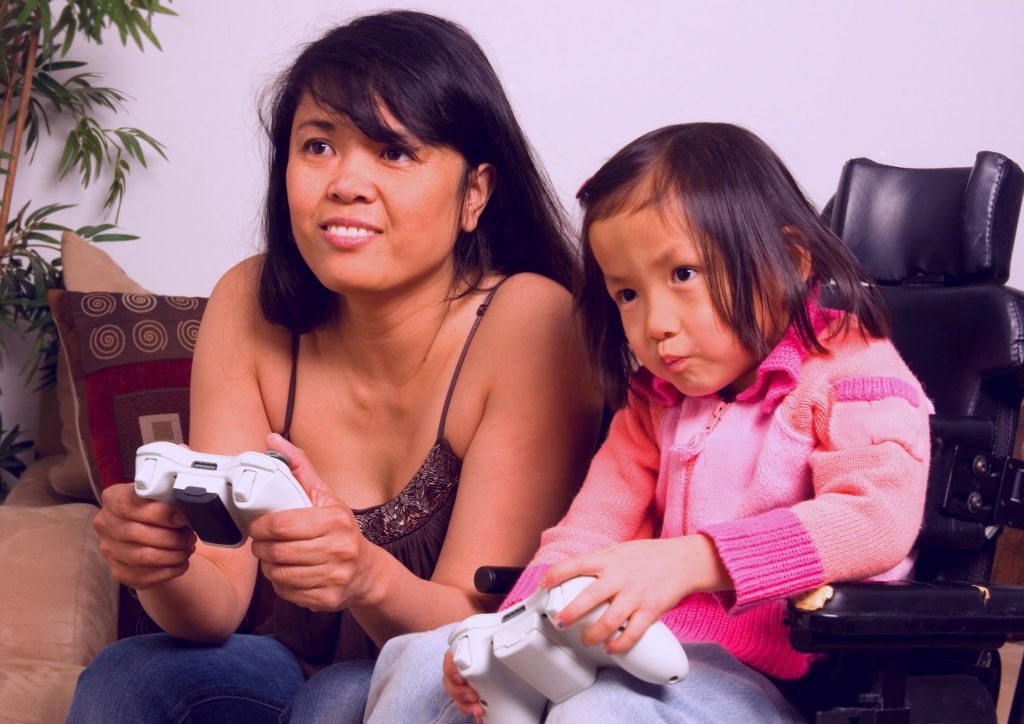

Gardening
Whether you or your loved one have access to a small balcony or large backyard there are a range of outdoor activities people with disabilities can participate in, with one of the simplest and most cathartic options on the list being gardening. For people living with impaired mobility, gardening can provide a source of exercise, friendship, stimulation and relaxation. In addition, it can also develop new motor skills and help improve:
- Fitness – it is a great physical activity
- Confidence – by helping to develop a range of new skills
- Wellbeing – by helping with relaxation and reducing stress levels
- Physical ability – through improved motor skills
- Knowledge – teaching participants about the environment and nature
People with disabilities can be involved in many gardening activities and get their green thumb through watering, planting, pruning, weeding, flower picking, and harvesting garden produce to name a few.
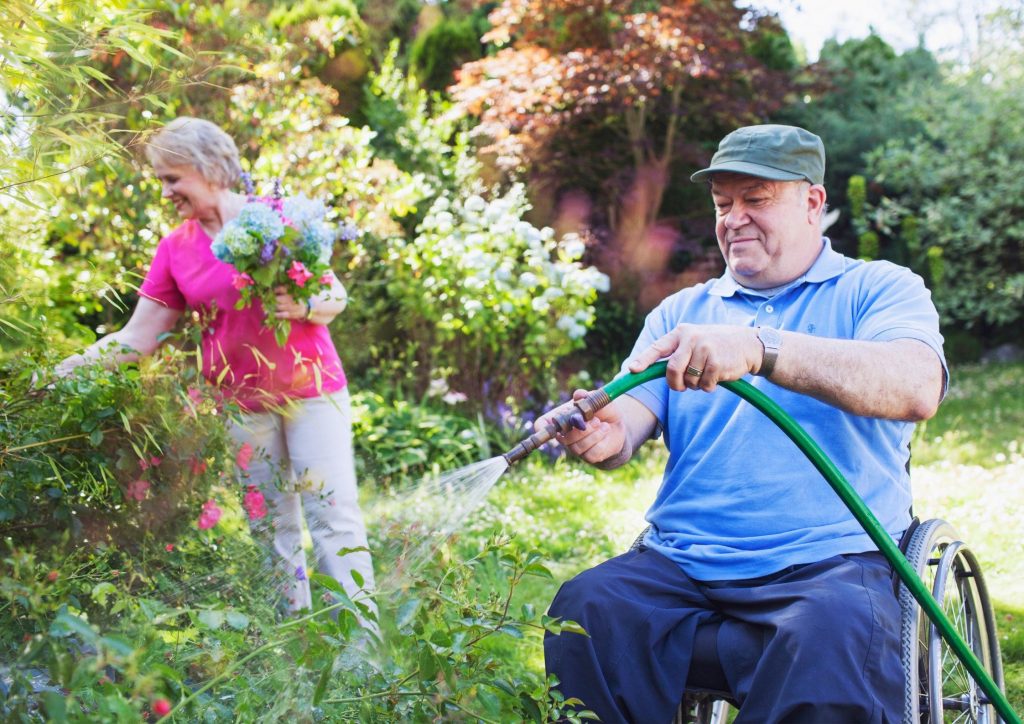

Activities to Benefit People with (Not Limited to) Intellectual Disabilities
Intellectual disabilities causes a person to have certain limitations in cognitive functioning which can affect the development of everyday skills such as communication, socialising and self-care. There are many types of intellectual disabilities and many causes including genetics, complications during pregnancy, problems during birth, diseases or toxic exposure. Intellectual disabilities are one of the most common developmental disabilities out there. It is difficult enough to integrate into society when living with an intellectual disability, and being stuck at home can severely decrease the motivation and desire to keep mentally stimulated. Next time you or someone you love is in this position, you can try one of the following at home activities to keep them inspired in their day.
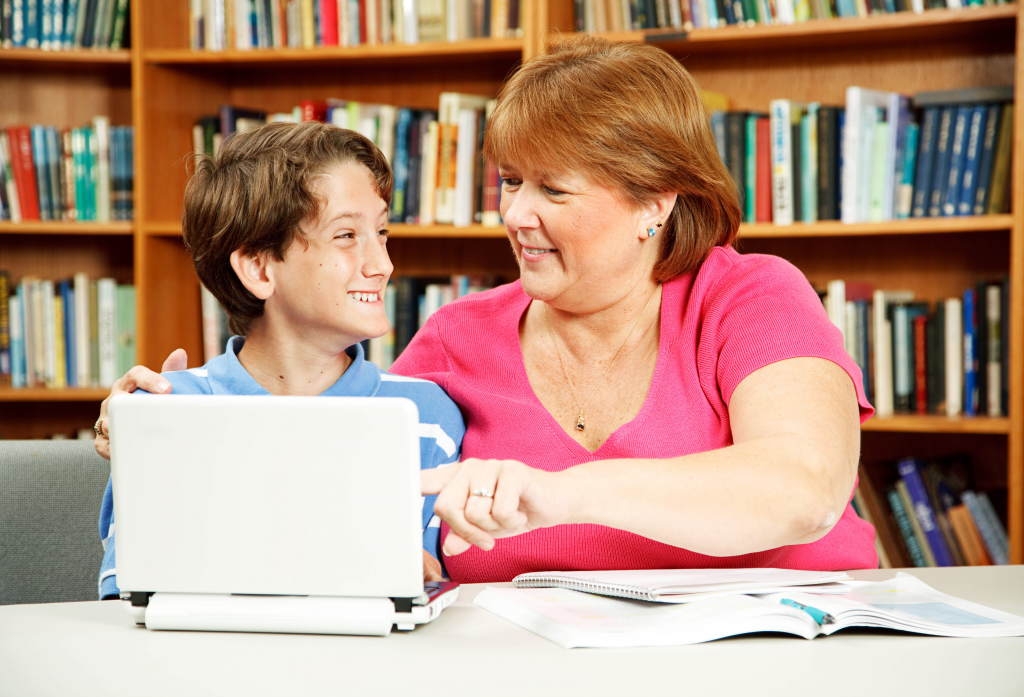

Sensory Play
A lot of the time, sensory play is encouraged for everyone during their early developmental stages in life. However for adults with disabilities, like autism, sensory play at home can become an important part of continually developing new skills and shaping their own understanding of the world. What you can use as part of sensory play in the home is endless, it just requires a little bit of creative thinking. Some sensory activities people with intellectual disabilities can engage with include:
- Sight – through jigsaw puzzles, looking through a kaleidoscope, using glow-in-the-dark paint to create a picture that can only be seen when the lights are off, or organising beads according to their color
- Touch – through playing with Play-Doh, popping bubble wrap, playing with someone’s hair or creating a sensory bin with different types of dry rice and pasta
- Smell – through making candles using different essential oils, cooking a recipe and smelling the different ingredients, playing match the smell with essential oils or creating art with scented markers
- Taste – through playing a tea taste test, making and eating an ice cream sundae, tasting flavours with various types of fresh produce, or mixing together different foods not commonly found together and seeing if anything tastes good!
- Sound – through exploring the different sounds in the kitchen, listening to wind chimes, painting a picture and describing what action is being done through every stroke, or reading a story out loud
Sensory play in both adults and children with intellectual disabilities alike can help build new nerve connections in the brain, encourage further development of motor skills, support language development, encourage problem solving and inspire creativity.
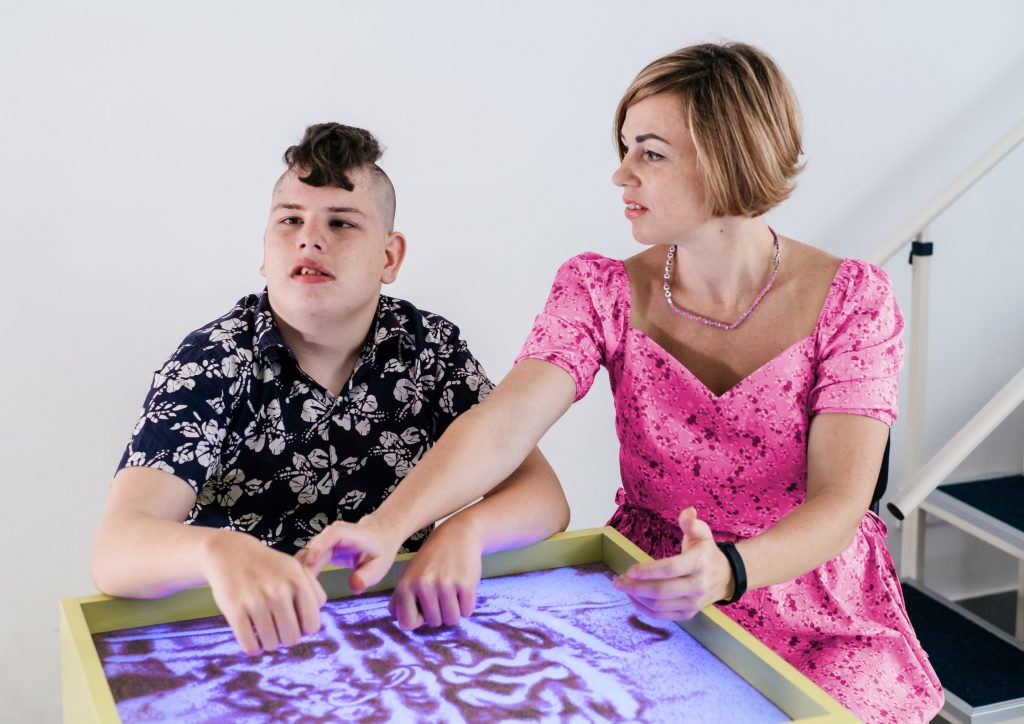

Learning a New Language
People with intellectual disabilities need to work harder than most when learning a new language but with the right support and patience, it can have a profound affect on their overall development and boosting self confidence. Learning or teaching a foreign language to a loved one with a disability can feel like a daunting task however, there are a few methods you can apply to make it easier to help reduce any anxiety around the idea.
Research has shown that developing phonological skills first and knowing the fundamentals of phonology in your native language before learning a foreign language is key. This solid skill will allow you or your loved one easier decoding of the sounds function of the foreign language your choose, and help build a solid foundation for when you are ready to undergo the next phase of learning. The next steps to adaptable teaching or learning a foreign language are:
- Choosing a foreign language similar to your native tongue as a start
- Slowing the pace of teaching or learning
- Reducing the vocabulary to simpler terms and phrases
- Incorporating multisensory stimulation when reviewing your learning
Learning a foreign language has a variety of cognitive benefits including improved memory, problem-solving and critical-thinking skills, enhanced concentration, the ability to multitask, and improved listening skills. In addition you or your loved one will elevate your individual self esteems, invite fresh perspectives and deepen that connection with another culture.
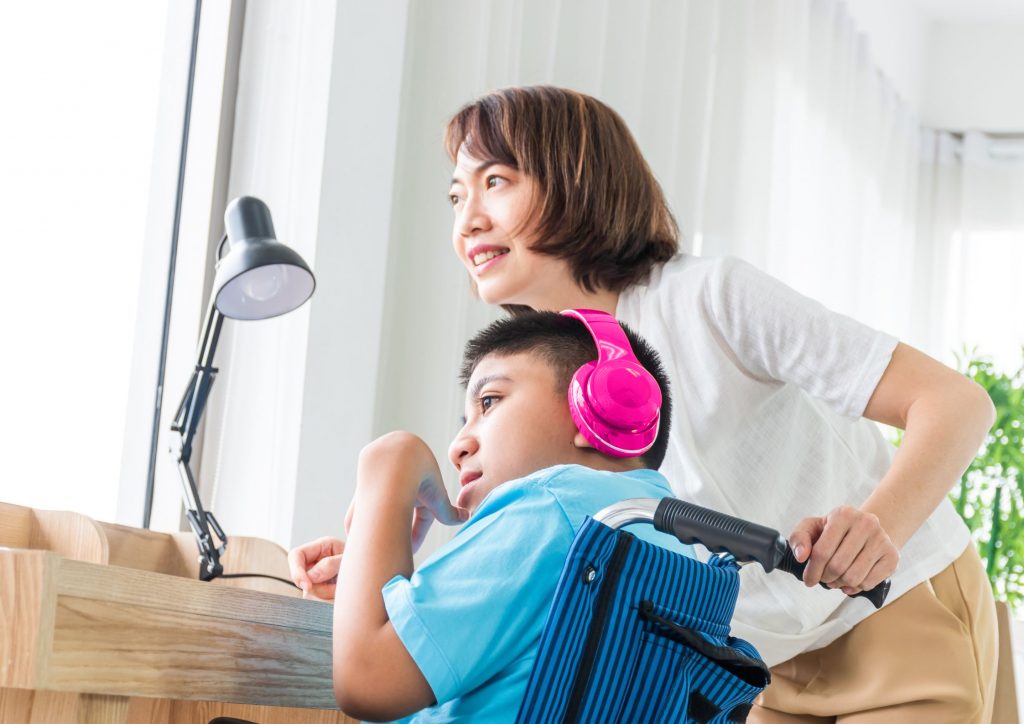

Adaptive Journaling
Being able to express oneself through writing can help ease tensions of depression, anxiety and stress. Effective journaling and expressive writing is a practice that can help improve your quality of life by providing an outlet that will allow creativity to flourish and improve cognitive ability.
When living with an intellectual disability, writing can be a challenge because of the complex cognitive process involved in which different components of the brain are required to co-play. However, studies have shown that by providing the right guides and inspiration, adaptive journaling can still provide you or your loved one the necessary outlet when you are looking for an activity to do that home. Techniques to include can be one of the following:
- Watching videos – inspirational videos and short films can help prompt ideas or observations
- Using images – content you emotionally connect with can be used as sources of inspiration
- Utilising templates – can help guide your writing style
- Revising – rewriting the same piece can encourage new writing styles, angles and perspectives
- No judgments approach – journaling is a private and emotional experience, write whatever you feel and allow that creative expression to flow freely without fear, bias or self-doubt
Overall adaptive journaling is a simple and effective way to boost your mood, improve memory and enhance your overall sense of emotional and mental well being, especially if you are stuck at home and require a quick outlet for those bottled emotions.


Mindfulness Meditation
Meditation has proven to have ample benefits to the body and mind by helping keep us focused, and enhance the awareness of ourselves and our environment. Many people living with disabilities could struggle with symptoms such as fatigue, stress, anxiety, and depression to name a few. In addition, feeling stuck at home can take an even greater toll on our mental health. Mindfulness meditation is a strategy that can provide you or your loved one with a sense of control and escapism while at the same time, help develop healthy and effective coping strategies. Mindfulness meditation can fall into one of two categories:
- Focused-attention meditation – concentrates attention on a single object, thought, sound, or visual. It centers your thoughts and focuses on ridding your mind of any distractions through the assistance of rhythmic breathing, an affirmation, or calming sound.
- Open-monitoring meditation – encourages awareness of your internal and external locus of controls. This includes, all aspects of your environment, inner thoughts, and sense of self. It may include becoming aware of suppressed thoughts, feelings, or impulses.
There are various online and app-based meditation resources available that can allow you or your loved one to progress their practice in the comfort and safety of your own home.
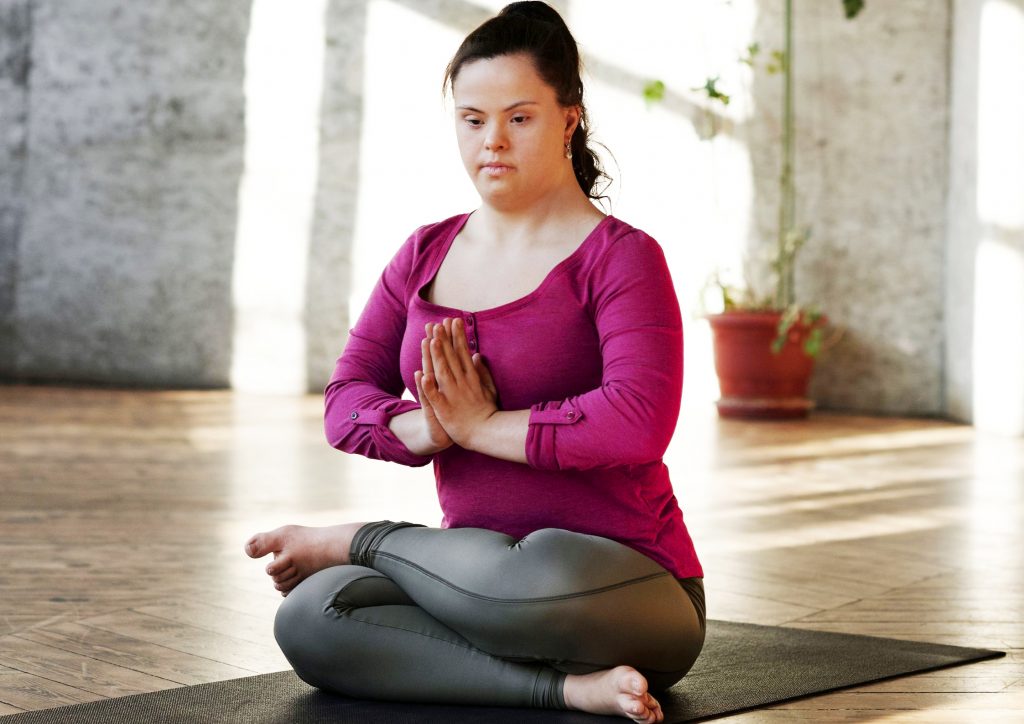

Arts & Craft Therapy
Developing art skills through creative expression can help improve the mental, physical and emotional well-being of people living with disabilities by facilitating self-expression and developing new coping strategies.
Although you or your loved one might have limited ability art therapy sees possibility as it views art as an avenue to explore your feelings, reconcile emotional conflicts, foster self-awareness, improve reality orientation, reduce anxiety, and increase self-esteem. If you or your loved one are are stuck and home, here are some creative art and craft activities to do:
- Developing origami
- Beading activities
- Crafting with clay
- Creating paper mache
- Decorating with paint
- Creating with fabric
Art therapy inspires creativity and can be used to encourage people of all ages and abilities to think creatively and create their own personal masterpiece. Whether it’s creating with a canvas, paper, paint or clay; you and your loved one will spend hours feeling inspired.
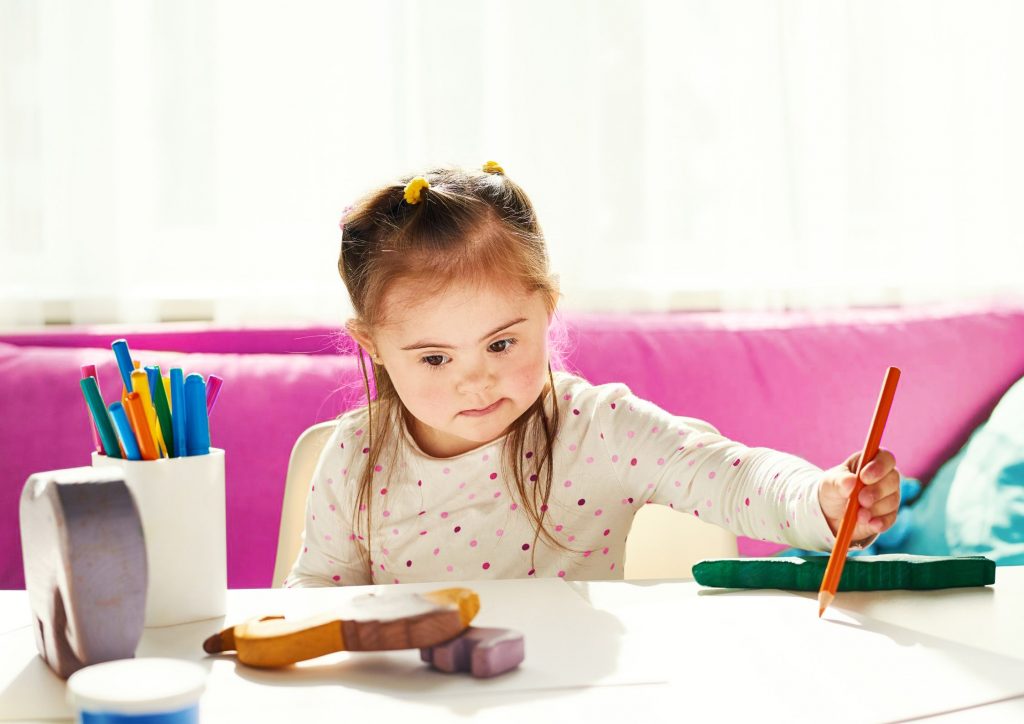

It can be quite a challenge to keep motivated and elated when you are living with a physical or intellectual disability; you might feel limited or discouraged to explore different recreational activities out of fear or judgment. Stepping out of your comfort zone, believing in possibility, and trying something new can be beneficial for the mind and body. Whether is it learning a new instrument, nurturing a garden or creating your own masterpiece, the possibilities for what activities people with disabilities can accomplish at home are endless.
At Nurse Next Door, we are celebrating ageing and are passionate about Making Lives Better.
To learn more about The Power of Happier Ageing you can download our report
or contact us today on 1300 600 247 to discuss how Nurse Next Door can help you keep doing what you love.
